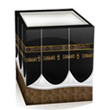Chapter 236: The Merit of Emancipation of Slaves
- Details
- Category: Ryahd Salehine
- Published on Monday, 07 October 2013 12:22
- Hits: 792
Chapter 236
The Merit of Emancipation of Slaves
Allah, the Exalted, says:
"But he has not attempted to pass on the path that is steep (i.e., the path which will lead to goodness and success). And what will make you know the path that is steep? (It is) freeing a neck (slave).'' (90:11-13)
1358. Abu Hurairah (May Allah be pleased with him) reported: The Messenger of Allah (PBUH) said, "He who sets free a Muslim slave, Allah will deliver from the fire of Hell every limb of his body in return for every limb of the slave's body, even his private parts.''
[Al-Bukhari and Muslim].
Commentary: It was the result of such instructions that the Companions of the Prophet (PBUH) did their best for the liberation of slaves. Abu Bakr As-Siddiq (May Allah be pleased with him) bought many slaves and set them free. `Abdur-Rahman bin `Auf released as many as thirty thousand slaves. `Abdullah bin `Umar liberated more than a thousand of them. It is stated that some Companions of the Prophet (PBUH) released eight thousand slaves within one day. May Allah be pleased with all of them. (Ibn `Allan and Nuzhat Al-Muttaqin).
1359. Abu Dharr (May Allah be pleased with him) reported: I asked the Messenger of Allah (PBUH), "Which deed is most excellent?'' He replied, "Faith in Allah and Jihad in His path.'' I then asked, "Which slaves are most excellent (to set free)?'' He replied, "Those who are held in high esteem by their people and whose value is higher.''
[Al-Bukhari and Muslim].
Commentary: It is evident that a slave who is more valuable in the eyes of his master will be difficult to part with, whether he is purchased to set free or liberated on one's own accord. Hence, it will be more meritorious to free such a slave than ordinary ones. This conduct furnishes the principle that the reward of sacrificing something for Allah goes with its quality. The more precious the thing sacrificed, the greater its reward will be. The Qur'an expressly states:
"By no means shall you attain Al-Birr - piety, righteousness - here it means Allah's reward, i.e., Jannah), unless you spend (in Allah's Cause) of that which you love.'' (3:92).
The institution of slavery is now finished, but its other forms do exist, i.e., debtor, guarantor, prisoners, etc. To liberate these from their burden is a meritorious act, and all these forms are covered by the Quranic phrase "freeing a neck'' (slave, etc.).





















